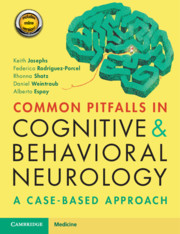Book contents
- Common Pitfalls in Cognitive and Behavioral Neurology
- Common Pitfalls in Cognitive and Behavioral Neurology
- Copyright page
- Dedication
- Contents
- Diseases Discussed in the Book
- Preface
- Acknowledgements
- Abbreviations
- Part 1 Missing the Diagnosis Altogether
- Part 2 Misidentifying the Impaired Cognitive Domain
- Part 3 Missing Important Clues in the History
- Part 4 Failure of Pattern Recognition
- Part 5 Difficult-to-Characterize Cognitive/Behavioral Disorders
- Part 6 Clinical Findings That Are Subtle
- Part 7 Misinterpreting Test Results
- Part 8 Attributing Findings to a Known or Suspected Disorder
- Part 9 Missing Radiographic Clues
- Part 10 Management Misadventures
- Case 46 I Don’t Know When to Stop
- Case 47 Is It Still Helping?
- Case 48 Caring for the Caregiver
- Case 49 Better Safe than Sorry?
- Case 50 Great Expectations
- Case 51 Nothing Can Be Done
- Index
- Plate Section (PDF Only)
- References
Case 51 - Nothing Can Be Done
from Part 10 - Management Misadventures
Published online by Cambridge University Press: 03 November 2020
- Common Pitfalls in Cognitive and Behavioral Neurology
- Common Pitfalls in Cognitive and Behavioral Neurology
- Copyright page
- Dedication
- Contents
- Diseases Discussed in the Book
- Preface
- Acknowledgements
- Abbreviations
- Part 1 Missing the Diagnosis Altogether
- Part 2 Misidentifying the Impaired Cognitive Domain
- Part 3 Missing Important Clues in the History
- Part 4 Failure of Pattern Recognition
- Part 5 Difficult-to-Characterize Cognitive/Behavioral Disorders
- Part 6 Clinical Findings That Are Subtle
- Part 7 Misinterpreting Test Results
- Part 8 Attributing Findings to a Known or Suspected Disorder
- Part 9 Missing Radiographic Clues
- Part 10 Management Misadventures
- Case 46 I Don’t Know When to Stop
- Case 47 Is It Still Helping?
- Case 48 Caring for the Caregiver
- Case 49 Better Safe than Sorry?
- Case 50 Great Expectations
- Case 51 Nothing Can Be Done
- Index
- Plate Section (PDF Only)
- References
Summary
This 70-year-old right-handed man presented with a 4-year history of worsening forgetfulness. Since his retirement as a lawyer he noticed increasing difficulties recalling recent conversations and finding words. His family reported he was unintentionally repeating questions and stories. In addition, he was not as active as before and spent more time watching TV. One year earlier, he discussed his concerns with his primary care physician whose evaluation revealed a Mini-Mental State Examination score (MMSE) of 24/30, unremarkable screening labs, and a brain MRI which showed mild generalized atrophy. He was told he had mild cognitive impairment (MCI) which is considered a predementia stage. He was on donepezil 10 mg daily and memantine 10 mg twice daily, with no meaningful changes in his cognition or function.
- Type
- Chapter
- Information
- Common Pitfalls in Cognitive and Behavioral NeurologyA Case-Based Approach, pp. 164 - 168Publisher: Cambridge University PressPrint publication year: 2020

